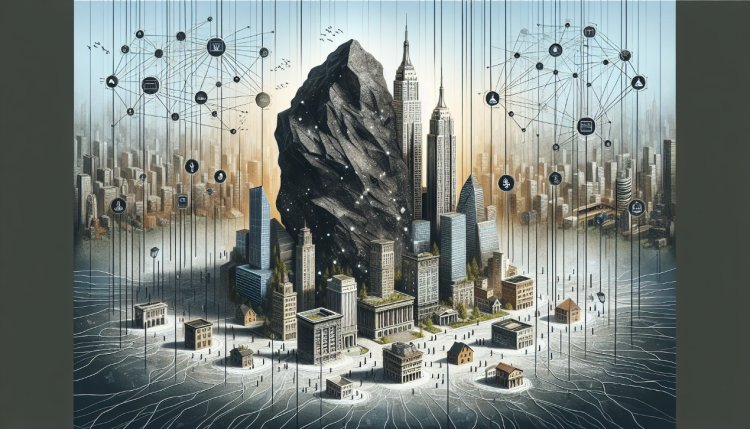Black Rock: Unveiling the Power and Influence of the World's Largest Asset Manager
Dive deep into the veiled world of BlackRock, the colossal asset manager shaping global markets. Uncover its hidden power, investment strategies, and far-reaching influence on economies, sustainability, and the future of finance. This is BlackRock unmasked.

Introduction
Black Rock is a very big company that manages a lot of money for people. They have a lot of assets that they take care of. In the second quarter of 2023, Black Rock had a total amount of money called Assets Under Management (AUM) that was worth USD 9.4 trillion. When we compare the sizes of different economies, Germany's gross domestic product (GDP) is around USD 4 trillion, California's is about USD 3.5 trillion, and Chad's is much smaller at only USD 12 billion. Many people are interested in and suspicious of Black Rock because it has a lot of money under its management, which gives it a lot of influence.
However, even though people think Black Rock is a bad force secretly controlling things, the truth is a bit more complicated. Black Rock owns small portions of many companies, but it doesn't have enough voting power to make big changes in these companies. In addition, Black Rock's impact extends beyond its financial strength. This is because important employees have relationships with politicians and former central bankers.
Larry Fink, who started Black Rock and is currently the CEO, has tried to present the company in a good way. He has taken initiative in dealing with environmental, social, and governance (ESG) matters and has strongly supported creating long-term value and being socially responsible. People have criticised Black Rock for their relationship with ESG. However, the company has made efforts to include ESG factors in its investment process.
In general, Black Rock has a lot of power and influence, and people have different opinions about it. Some people criticise it, while others support it. Although Black Rock may not have as much power as some people think, their actions behind closed doors can still affect markets and consumers. As we explore more about the power of Black Rock, we can see that it goes beyond just its money and raises concerns about what its actions might mean for the future.
Black Rock's Power: Examining the Facts
Many people have been wondering about how big and powerful Black Rock is, and some people are worried about how much control it has. But it's important to look at the facts and get a better understanding of what's going on.
Explaining Black Rock's size and criticism
BlackRock is the biggest asset manager in the world. They have a really big amount of money, $9.4 trillion, that they manage for their clients. Although this amount is impressive, it is important to consider it about other factors. For instance, Germany's gross domestic product is approximately 4 trillion US dollars. This demonstrates that Black Rock's assets under management are not extremely large in comparison.
Even though Black Rock has a large amount of money invested, it doesn't have enough voting power to make big changes in the companies it has smaller ownership in. This fact shows that Black Rock does not actually have unlimited power and control in the corporate world, contrary to what some people may think.
Clarification of Black Rock's ownership and voting rights
Many people argue about who owns the companies that Black Rock controls. But it's important to remember that the clients of Black Rock are the actual owners of the shares, and, as a result, they have the right to vote. Although Black Rock can vote on behalf of its clients in certain situations, it does not have the power to control decisions in every company it invests in. Usually, Black Rock only has a small ownership stake and doesn't have enough voting power to make significant changes.
Discussion on the boundaries of passive funds and portfolio management
Passive funds, like the ones managed by Black Rock, have certain limitations or restrictions. These funds usually don't handle the complex details of the companies they invest in, and they may not have enough staff to make specific decisions. Instead, they choose to invest by tracking indices, which means they are less involved in the day-to-day operations of the companies.
Analysis of the employment of former politicians and central bankers at BlackRock
It's important to mention that Black Rock hires people who used to work as politicians and central bankers. This has caused some people to criticise them. While it is not unusual for this practice to occur in the financial industry, it does bring up concerns about possible conflicts of interest and political influence. It's important to keep personal relationships separate from how the company operates.
To put it simply, understanding the power and influence of BlackRock is not easy and requires a careful and detailed understanding. While some critics may exaggerate the level of control, it is still important to acknowledge the limitations of passive funds and minority stakes. We should be careful when considering hiring former politicians and central bankers for jobs. When we examine the facts, we can better understand the role that Black Rock plays in the world of finance.
The Rise of ESG and Black Rock's Role
BlackRock is a really big company that manages a lot of money. They have helped make environmental, social, and governance factors more important in investing. Larry Fink, who started Black Rock and is now its chief executive, has been a leader in creating value over the long term and being socially responsible.
Integration of ESG factors
Black Rock has made efforts to include ESG factors in how it decides to invest. The company understands that certain things can affect how well it does financially in the long run. So, it takes into account environmental, social, and governance factors when making decisions.
Larry Fink's letter to CEOs
In 2017, Larry Fink wrote a letter to the CEOs of companies that are listed on the stock market. In the letter, he talked about how these companies need to think about creating value for the long term and also to be responsible towards society. This letter was seen as a very important moment for ESG investing. It showed that even the biggest asset managers were taking ESG seriously.
Criticism and reaction
Even though Black Rock has tried to include ESG factors, some people have criticised the company for not doing more in the field of ESG investing. Some people say that Black Rock's investments in fossil fuels don't match its promise to focus on environmental, social, and governance (ESG) issues. In response, Black Rock has decided to stop investing in companies that make more than 25% of their money from producing thermal coal.
Rebranding for sustainability
Black Rock has also updated its branding to show that it is now more focused on sustainability. In 2021, the company made an announcement that it would change the name of its ESG-focused funds to Sustainability. The purpose of this rebranding is to highlight the good parts of sustainability and address the divisive nature of the term ESG.
In general, Black Rock has done a good job of considering environmental, social, and governance (ESG) factors in their investment decisions. Larry Fink, the CEO of Black Rock, has also been a strong supporter of creating long-term value and being socially responsible. These efforts have been significant in the increasing popularity of ESG investing. The company has received criticism for its investment decisions and commitment to environmental, social, and governance (ESG) practices. However, it has made efforts to address these concerns and make its investments more in line with sustainability goals.
Black Rock Faces Opposition: The Anti-ESG Movement
While BlackRock has tried to include environmental, social, and governance (ESG) factors in its investment process, some people still have concerns and criticisms about the company. Vic Ramaswami is a presidential candidate who strongly disagrees with including ESG factors in investments. He is a prominent figure who has spoken out against it.
Ramaswami started Strife Asset Management, which is an investment company. Their goal is to represent the majority of Americans who think companies should mainly focus on making money. Ramaswami has gained support from conservative think tanks, Republican politicians, and Wall Street figures. The contributions of billionaire investors like Peter Thiel and Bill Looman have made this support possible.
Ramaswami is not the only one who disagrees with ESG criteria in investments. Some other political figures and states also oppose it. In Texas, the government has decided to stop giving money to financial companies that are not supportive of fossil fuel companies. West Virginia has decided to ban certain Wall Street firms for the same reason. Blake Masters, a Republican Senate candidate in Arizona, has expressed concern about the impact of ESG criteria on America. He believes that these criteria pose a significant threat to the country's existence. Furthermore, Governor Ron DeSantis of Florida has prohibited the state's pension fund managers from taking into account social, political, or ideological factors when making investment choices.
There is ongoing disagreement about the importance of ESG criteria in investments and how they can affect politics. Supporters believe that using ESG criteria is very important because it helps encourage sustainable practices and safeguards the environment. They think that companies should not only focus on making money but also think about how they affect society. However, some people who disagree with ESG criteria say that they are too focused on politics and can be used to promote a specific agenda. They think that companies should only concentrate on making the most money for their shareholders.
The people who are against ESG (environmental, social, and governance) investing have valid concerns about investments becoming too political. However, it's also important to think about the consequences of ignoring ESG factors in the long run. Including ESG criteria in business practices can help promote sustainability and responsibility, leading to the creation of long-term value. Finding a middle ground between making money and taking care of everyone involved is crucial for companies to thrive and last.
Larry Fink's Defence: Stakeholder Capitalism
Larry Fink, who started Black Rock and is now the CEO, strongly supports stakeholder capitalism. He thinks that capitalism should not just be about making money for the people who own the company but should also think about how it affects the workers, customers, suppliers, and the community. Fink's idea of stakeholder capitalism focuses on the importance of everyone benefiting and creating value for the long term.
Relationship between capitalism, mutual benefit, and long-term value creation
Fink believes that capitalism should be based on relationships where both parties benefit from each other. He thinks that companies that focus on taking care of their stakeholders will eventually achieve long-lasting and profitable growth. Companies can create strong relationships and long-term value by taking into account the interests of their employees, customers, suppliers, and the community.
Fink is criticized for his capitalist view.
Some people have criticised Fink's focus on stakeholder capitalism because they think companies should only focus on maximising value for their shareholders. Critics say that Fink's approach is too political and might seem like he is promoting a specific agenda. However, Fink argues that stakeholder capitalism is not related to politics or a social ideology. Instead, it is about fairly pursuing profit through mutually beneficial relationships.
The pursuit of profit and long-term profitability as a measure of success
Fink believes that stakeholder capitalism considers the needs of different groups involved, but it still values making money and being profitable in the long run as important indicators of success. He thinks that companies can only do well and make money for the people involved if they can manage their finances effectively. Fink's approach understands that it is important to consider the needs of different people involved in the business while also making sure that the business is financially stable.
In simple terms, Larry Fink believes in a type of capitalism called stakeholder capitalism. This means that he thinks capitalism should consider the needs and interests of all people involved, not just a few. It's a more comprehensive and inclusive way of doing business. Fink believes that companies can help everyone by focusing on things like mutual benefit, creating long-term value, and making money. This can lead to sustainable growth and the well-being of all the people involved. Even though some people have disagreed with his ideas, Fink still believes strongly in including the opinions and concerns of all those involved in Black Rock's investments.
Black Rock's Dominance and Influence
Black Rock is a very big company that manages a lot of money. They are one of the most important companies in the industry. BlackRock is a very big company with $9.4 trillion in assets that they manage. However, it is important to consider this from a broader point of view. Although the amount of assets being managed is significant, it is not extremely large when compared to other economic indicators like gross domestic product.
Even though Black Rock is a big company, it doesn't have enough voting power to make important decisions in companies where it only owns a small portion. This challenges the idea that Black Rock has complete and unlimited power and control in the business world.
Many people often argue about who owns the companies that Black Rock controls. But it's important to remember that the clients of Black Rock are the actual owners of the shares and voting rights. Although Black Rock can vote on behalf of its clients in certain situations, it does not possess the power to control decisions in every company it is invested in. Usually, Black Rock has a small ownership stake and doesn't have enough voting power to make significant changes.
Passive funds, like the ones managed by Black Rock, have certain limitations or restrictions. These funds usually don't handle the complex details of the companies they invest in and may not have enough staff to make specific decisions. Instead, their investment strategy focuses on following market indices, which means they are less involved in the day-to-day operations of companies.
People have criticised Black Rock for hiring former politicians and central bankers. While it is not unusual for this practice to occur in the financial industry, it brings up concerns about possible conflicts of interest and political influence. It's important to keep personal connections separate from how the company operates.
Black Rock has a lot of influence, not just because of its money. Black Rock's inclusion of ESG considerations in its investment process has influenced the rise of environmental, social, and governance (ESG) factors in investing. Larry Fink, the person who started and leads Black Rock, strongly believes in stakeholder capitalism. He thinks it's important to think about how our actions affect employees, customers, suppliers, and society.
Black Rock has created Aladin, a network that handles a lot of money in assets and debts. This electronic system is very important for major banks, investment funds, and even the Federal Reserve. It helps them make money decisions. Aladin is a powerful tool that Black Rock uses to make important decisions based on data. It gives them a lot of control and helps them have a big impact.
Black Rock's position of power and impact in the asset management industry is intricate and has many different aspects. Although the firm does not have unlimited power, it is still a significant player due to its size, technical systems, and integration of ESG factors. However, it is crucial to carefully consider the drawbacks, possible dangers, and broader consequences of its actions.
The controversial rise of Aladin
People have both praised and criticised Black Rock for being very powerful and influential in the asset management industry. But there is one part of Black Rock's business that has been getting a lot of attention and causing controversy. It's called Aladin, and it's a network for managing assets, liabilities, and debt investments.
Explaining the origins and importance of Aladin
In the late 1980s, Black Rock created Aladin, a super-smart robot. They wanted Aladin to be better than any computer or person at understanding market risks and opportunities. Over time, Aladin has developed a great skill for accurately predicting which investments in the global bond market will be successful and which ones will not.
Black Rock uses Aladin as its primary electronic system to manage $21.6 trillion in assets, which is a sizable sum of money. Black Rock's immense control and data-driven decision-making have greatly increased its influence in the financial world.
An overview of Aladin's role in the global financial crisis
During the global financial crisis in 2008, Aladin played an important role in guiding big banks, investment funds, and even the US Federal Reserve. People who make important decisions and are having a hard time with the failing financial markets asked for his help and advice.
However, some people were worried about possible conflicts of interest because Aladin and its data-driven decision-making process were heavily relied upon. Some people said that Black Rock, which owns Aladin, could use its power to control markets or give special treatment to its own assets.
Criticism of potential conflicts of interest
People have criticised the fact that Black Rock owns Aladin because it could create a conflict of interest. If Aladin gives investment advice, Black Rock could use that information to benefit themselves and possibly influence the markets.
But it's important to remember that Black Rock only owns a small portion of most companies. Aladin's recommendations are based on careful analysis of data, not personal opinions. The company has also made efforts to deal with concerns and make sure that Aladin's recommendations are fair and clear.
Analysis of Black Rock's expansion into ETFs and impact on Aladin's influence
With Black Rock's acquisition of Barclays' exchange-traded funds (ETFs) in 2009, Aladin's influence expanded beyond bonds and equities to include ETFs. This move allowed Aladin to exert a greater influence on the financial markets as a whole, as ETFs became a popular investment vehicle for retail and institutional investors.
However, people have been concerned about Black Rock having too much power because of their expansion into ETFs. Some people say that Black Rock's control of the ETF market might mean there isn't enough competition and they could manipulate the market.
Discussion on Black Rock's acquisition of eFront and the impact on control of all asset classes
In 2021, Black Rock bought eFront, a company that makes software for alternative investments and private markets. By acquiring this company, Black Rock was able to strengthen its control over different types of investments, such as private equity and real estate.
Black Rock's decision to use eFront's technology to expand into different types of investments has advantages. It helps them analyse data more effectively and find better investment options. However, there are also concerns about this expansion. It could lead to too much power being concentrated in one place and potential conflicts of interest arising. Some people say that if Black Rock controls everything, it could stop other companies from competing and limit the chances for others to invest.
Some people in Black Rock have different opinions about Aladin's success. They are worried that there might be conflicts of interest and manipulation happening in the market. As Black Rock grows and gains more power in different areas of investment, it becomes more crucial to keep a close eye on what they do and make sure they follow fair and clear rules in the financial markets.
The Future of Black Rock's Power
People are worried and talking about what might happen in the future because Black Rock is gaining more control and power. Let's discuss some important aspects of what might happen to Black Rock's power in the future.
Continued growth of control and influence
Black Rock has been getting bigger and managing more money over time. By the second quarter of 2023, they expect to have $9.4 trillion in assets under management. The fact that it keeps growing makes it even more clear that it is the biggest asset manager in the world. This also makes people wonder how much control and influence it has in the financial industry.
Concerns about a single robot controlling global wealth
A major worry is when one company has too much power, especially with the growing influence of Aladin, which is Black Rock's network for managing assets, liabilities, and debt investments. Aladin is responsible for handling a very large amount of money, which is worth trillions of dollars. He also has an important role in making important financial decisions for big banks, investment funds, and even the US Federal Reserve. We are not sure what could happen if one robot controlled all the money in the world. It is important to think about this situation very carefully.
Possible consequences and risks of Black Rock's dominance
Black Rock's control over the wealth management industry has some possible negative outcomes and dangers. Critics say that because it is so big and powerful, it might prevent fair competition and manipulate the market. People are worried about situations where someone's personal interests might interfere with their ability to make fair decisions. They are also concerned about how politics can affect decision-making and how a small group of people can control power. We need to keep a close eye on what Black Rock is doing and make sure they are being fair and transparent in the financial markets.
Recent actions and developments
Black Rock has been successful in incorporating environmental, social, and governance (ESG) factors into its investment process. This has been a significant factor in the increasing popularity of ESG investing. Larry Fink's support for stakeholder capitalism and creating long-term value has also influenced the way the company operates. Some recent actions have involved companies deciding to stop being involved in producing a lot of thermal coal. They have also changed the names of funds that focus on environmental, social, and governance issues to be called sustainability funds instead. Black Rock is taking these actions to respond to criticism and make sure its investments support sustainability goals.
Impact of the Rise of Black Rock
Black Rock's emergence has affected markets, consumers, and the overall financial landscape. The power and influence of this entity go beyond just money. It brings up concerns about responsibility, fairness, and who has control in the industry. We should carefully analyse the boundaries of Black Rock, the possible dangers it poses, and the lasting effects it may have.



 admin
admin 










